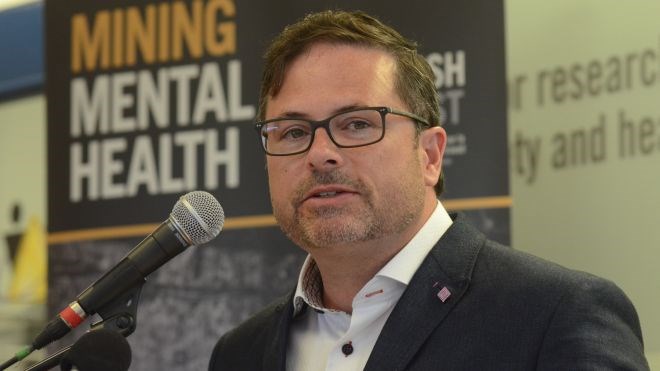As researchers with the Centre for Research in Occupational Safety and Health (CROSH) prepared to launch their Mining Mental Health study, they needed about 30 workers for a pilot project to test out their survey before getting the study underway.
It was just a precursor to the actual research, but a whopping 80 workers came forward, and many were disappointed when they were told they weren’t needed, said Dr. Michel Larivière, associate director at CROSH, an initiative of Laurentian University in Sudbury.
“This told me just how far we had already gone on the issue of mental health and on the issue of being able to speak about it,” said Larivière, a keynote speaker during Workplace Safety North’s annual mining conference on April 19.
“Here we had a bunch of people coming forward and saying, ‘I want to be part of the pilot study.’”
Launched in 2015, the three-year, $400,000 Mining Mental Health study is a joint initiative of Vale, the United Steelworkers and CROSH that aims to examine mental health issues in the mining industry.
The work is significant, Larivière said, because little research has been done on the topic to date.
But the overall cost of mental health disability in Canada is about $50 billion annually. Time lost to short-term disability claims runs about 72 days for mental health-related issues, Larivière said.
For the average-sized mining company, that roughly equates to 14,000 lost days, or 40 per cent, per year. He thinks that’s a low appraisal.
“I think this is an extraordinarily gross underestimation of the true number,” said Larivière, who is also a practising psychologist in Sudbury. “The reality is people don’t like talking about these issues, and in my experience don’t even like talking about these issues with their family doc.”
Now nearing the end of year two of the Mining Mental Health study, Larivière provided an update on how the work is going so far.
Using feedback gleaned from volunteers in the test study, researchers came up with a survey comprising 558 questions, or 45 pages, which took workers an average of 60 minutes to complete.
Researchers then applied standard measuring scales to assess various conditions related to mental health: post-traumatic stress disorder, depression and anxiety, fatigue, drug use, burnout, work/life balance, and more.
Larivière said it was important to researchers that anyone who was an employee with Vale’s Ontario operations would have an opportunity to participate.
So, between spring 2016 and fall 2016, researchers travelled to the mining company’s various sites throughout the province with pencils and paper surveys — an old-school approach taken to protect the integrity of the data, Larivière said.
“Given the sensitivity of the questions, I was actually afraid that very few people would participate,” Larivière said. “I really didn’t think many people would participate despite the good pilot project that we had, but in the end, more than half the workforce did.”
A total of 2,224 participants completed the survey, a number that is “far beyond my expectations,” Larivière said, but a number that will provide researchers with a good data set for analyzing the responses.
That analysis will take place this summer and will break down the data into variables to identify trends amongst participants. That could include pinpointing trends at different sites, among women, in people with children, or amongst people who just started their careers, as examples.
Researchers will also take into account qualitative data, or anecdotes, from participants — both good and bad. Larivière said he has heard about positive experiences: "I knew I had a shot at getting back to work because I had such strong support from my manager and my coworkers."
But he’s also heard about bad experiences: "The return-to-work process was more stressful than my illness and injuries. In fact, it was the biggest obstacle in my return to work."
Larivière is strong believer that “effective mining will only be as effective as the people who are working in the industry.”
While CROSH doesn’t yet know the study’s results, he preemptively implored leaders in the mining industry not to ignore them.
“Get to know the workforce that you’re leading,” Larivière said. “Do it scientifically, do it collaboratively, do it transparently and safely, and, please, I urge you to do something with the results that are produced from those efforts.”




